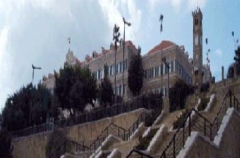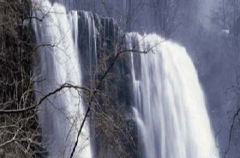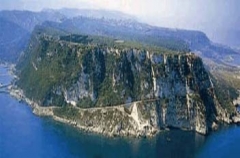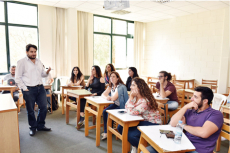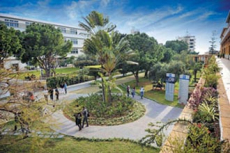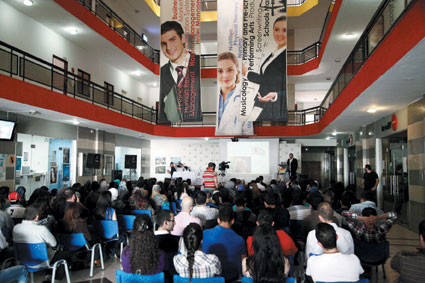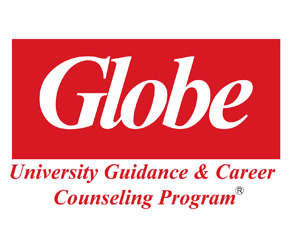Displaying items by tag: Universities
CULTURE
An interesting archaeological relic found throughout Lebanon is the hundreds of well-preserved mosaics from the Roman and Byzantine eras. Countless colorful, tiny stones form intricate images of mythological figures, religious deities, and geometric designs.The mosaic is symbolic of modern-day Lebanon, which is a country characterized by a diversity of cultures, traditions, and religions interwoven through time. It is this unique diversity which fascinates travelers.
Thanks to its location at the crossroads of Asia, Europe, and Africa, Lebanon has been shaped by many civilizations throughout history. Its position as a meeting point for diverse peoples is evident in the extraordinary richness of its archaeological sites and historical monuments. From Stone Age settlements to Phoenician city-states, from Roman temples to rock-cut Christian hermitages, from Crusader Castles to Mamluke mosques and Ottoman hammams, the country's historical sites are a true encyclopedia of ancient and modern world history.

Modern Lebanese society is characterized by this same cultural diversity. Most Lebanese people speak Arabic, English, and French. As you walk the streets of downtown Beirut, you will pass domed mosques and steepled churches, reflecting the country's religious and architectural legacies – Sunni, Shiia, and Druze Muslims; Maronite, Eastern Orthodox, and other Christians; and many others. Regionally, each part of the countryside has its own local flavor, with different villages preserving a different culinary, artistic, religious, or cultural traditions.
A visit to any of Lebanon's ancient archaeological ruins, traditional villages, or religious sites will truly give you a taste of the cultural mosaic of this captivating country.
CLIMATE
Lebanon is blessed with a mild Mediterranean climate and four distinct seasons. (June to September) is made for sun worshippers and water enthusiasts, with temperatures along the coast ranging from 20-32°C (68-90°F). Clear skies and little rain are perfect for outdoor cafés and seaside fun. Alternatively, head to the mountains for nice walks and cooler weather, typically 6-22°C (45-70°F).
Summer is the season for sampling mouth-watering cherries and vineyard grapes in the Békaa Valley.(October-November) brings crisp, cool weather to the mountains, 5-20°C (40-68°F), while remaining pleasantly warm on the coast and in the South, 15-28°C (60-85°F). Fall is a good time for apple picking in the North and viewing the harvesting of olives and machinations of olive presses all over the country.
(December to mid-March) is the time for outdoor sports, with six ski resorts catering to skiers and snowboarders of all skill levels, and kilometers of cross-country skiing and snowshoe trails to be explored. Because winter is the rainy season, the mountains get considerable snowfall. Temperatures fall to below 0°C at night and range from -5°C-5°C (25-40°F) during the day. The coast is wet and cool, with temperatures ranging from 10-20°C (50-67°F).
Fall and winter can be the ideal time to visit Lebanon's historical attractions and ruins while avoiding crowds and hot weather. On a fresh, crisp day you might find yourself as the sole visitor amidst the majestic ruins of Sour (Tyre) or Baalbek, feeling almost transported to the ancient days of the Phoenicians or Romans.

Lebanon warms again in the (April-May). As a result of the winter rain and the melting snow, the scenery comes alive with wildflowers, making spring the prime opportunity for hiking Lebanon's mountain trails and discovering its unique flora and fauna. Temperatures range from 0-15°C (32-60°F) in the mountains to 15-25°C (58-72°F) along the coast.
Higher Education In Lebanon
Lebanon's higher education is the oldest in the region and dates back to 1866 when the American University of Beirut (AUB) was founded under the name of the Syrian Evangelical College, followed by the Universityof Saint Joseph (USJ) in 1875,then by the Lebanese American University (LAU) in 1947as a Beirut College for Women.
The Lebanese University (LU) which is the only public university in the country was founded in 1951.
Haigazian University was founded in 1955,followed by the Beirut Arab University (BAU) in 1960 in collaboration with the Egyptianuniversity of Alexandria.
Most of the 40 higher education institutions currently in operation in Lebanon were legalised in the late nineties
when the private sector flourished in a suddenand rapid expansion following the 15 year civil war that Lebanon suffered between 1975 and1990 and which had a very damaging impact on the country’s higher education sector.The freedom and independence of Lebanese higher education are protected under the Constitution. Tertiary education in Lebanon is divided into two categories; vocational tertiary education and general or non-vocational higher education.
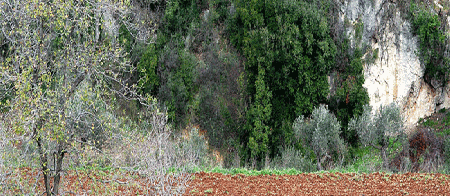
Higher education in Lebanon composes of Technical and Vocational Institutes, University Colleges, University Institutes and Universities. The Lebanese University is the only public institution. The Ministry of Education and Higher Education administrates the private and public sectors and Technical and Vocational Institutes are under the Directorate General of Technical and Vocational Education Directorate General of Higher Education has responsibility for University Colleges, University Institutes and Universities).
According to the World Bank database, gross enrollment rate of tertiary education is 46.9 percent for male, 56.3 percent for female, and 51.6 percent for total. (The World Bank 2009) Private enrollment share of tertiary education is 53.4 percent.
Female students are seen in every university program or field of specialization..
Following high school, Lebanese students may choose to study at a university, a college, or a vocational training institute. The number of years to complete each program varies.
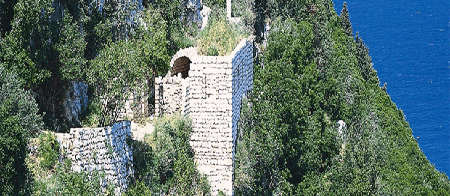
While the Lebanese educational system offers a very high quality and international class of education, the local employment market lacks enough opportunities, thus encouraging many of the young educated to travel abroad; Successful Lebanese engineers, doctors, businessmen, etc. are found practically all over the world. Lebanon has 42 nationally-accredited universities, several of which are internationally recognized. The American University of Beirut (AUB) and the Université Saint-Joseph (USJ) were the first Anglophone and the first Francophone universities to open in Lebanon respectively. The forty-one universities, both public and private, largely operate in French, or English as these are the most widely used foreign languages in Lebanon.
At the English universities, students who have graduated from an American-style high school program enter at the freshman level to earn their baccalaureate equivalence from the Lebanese Ministry of Higher Education. This qualifies them to continue studying at the higher levels. Such students are required to have already taken the SAT I and the SAT II (Subjects Test) upon applying to college, in lieu of the official exams. On the other hand, students who have graduated from a school that follows the Lebanese educational system are directly admitted to the sophomore year. These students are still required to take the SAT I, but not the SAT II.
List of Universities is available in another section. You may go to Universities






